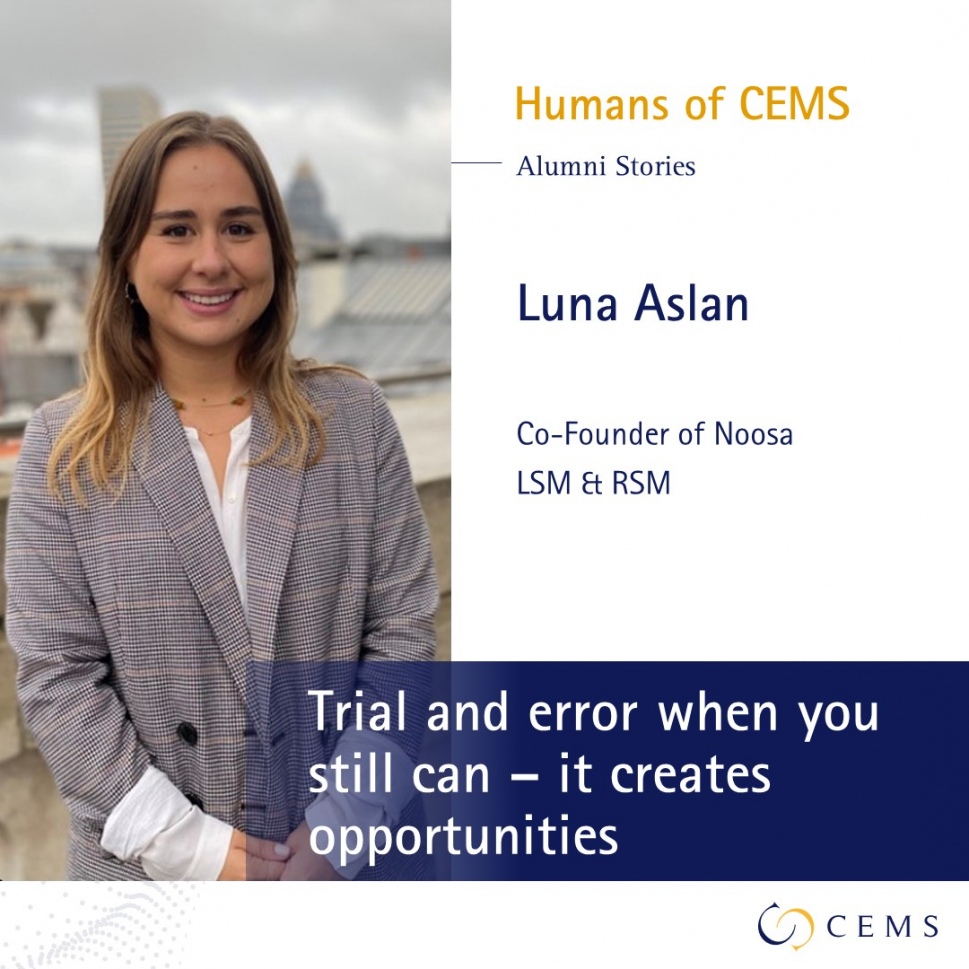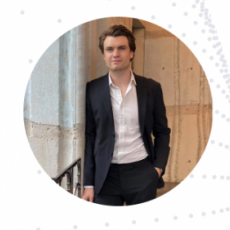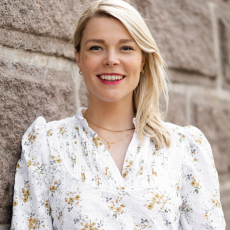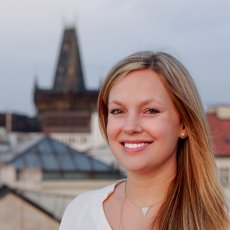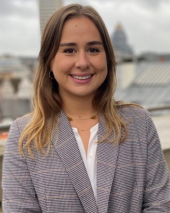
More info
The CEMS Global Alliance is a purpose led organization, powered by our beliefs that great leadership starts with self-leadership and societal progress requires continual exploration. In this series of interviews, we take a look at CEMS students and alumni that are contributing to make this world a more open, sustainable and inclusive world.
Humans of CEMS: Trial and Error when you still can - it creates opportunities.
Today, in our Humans of CEMS series, we meet CEMS Alumni Luna Aslan and Co-founder of Noosa. After graduating from Louvain school of management in 2018, she worked at Dior and later embarked on her path to follow her passion.
Could you please tell us in about you start-up in more detail?
A couple of months after graduating from CEMS, I co-founded my start-up that is called Noosa. At Noosa we produce and recycle a textile fiber that is made from corn. Basically, we start from corn to transform it into textile fiber, yarn, or any textile product. In parallel, we have developed a technology to recycle it at 100% at the end of life and this endlessly without being deteriorated. The textile industry is quite important, and you can apply our product in clothing and apparel but also everything that you can find home such as a curtain. Textile is everywhere, and the goal is to make the textile industry more circular and think of the end of life and the recycling before even putting a product on the market.
How did you come up with the idea for your start-up?
During my studies and while writing my master thesis, I was already very interested in everything that was innovative, but I soon felt that I was missing the chemistry background, so I changed my master’s thesis topic slightly and the will to have an impact came during the CEMS program. For example, in Louvain, we had a class called regenerative economy during which I discovered alternative business model that are more circular. A lot of entrepreneurs came to present their ideas on how to transform existing companies which is even harder than starting your own circular company. During my exchange at Rotterdam, I could feel that the weight of the sustainability topic was way more important among the students, this is how I truly developed interest in the topic. The idea of the start-up really came when I met my associate who has a chemist and bio engineering background, so we are complementary.
Did you set up your start-up right after university?
No, I think as many CEMS students I was seeing myself working in management consulting or in multinational companies. I started at Dior in the marketing department in Paris. I think I really felt pressured to quickly find a job so that it is not exactly what I envisioned as I was more interested in tech companies or financial roles, but I ended up in the marketing field. I think that without, a “bad experience” since I was not happy neither in the industry nor in the job, I would have not asked myself so many questions. After that experience, I wanted to take time to realize what I really wanted to do, what kind of impact I wanted to have, in which city and in what type of company. I have always known that I wanted to start my own company someday, but I thought it would be at least 10 years before I can have that because I believe that it is important to learn from other structures. Sometimes, it is frustrating because I feel that even in my own company now some things could be more efficient if I was aware and if I had more experience from a larger company.
You said that the CEMS program helped you develop interest in sustainability, circular and regenerative economy, do you feel that CEMS environment and community helped you while setting up your company?
Yes, I think that the CEMS network was a support. If I wanted to reach out to people on LinkedIn for example, I was sure I was going to get an answer. I found a lot of information from the contacts I had in Rotterdam which was useful to help me get started. Though sometimes I feel hard skills are overlooked in the CEMS program, the accessibility to the network can make up for it as you can really count on the CEMS community to help you provide with a 360 view of the company if you need.
Do you believe that a CEMS profile desirable (or helpful) for an entrepreneur such as you?
I think the skills that I learned thanks to the CEMS program are useful and make my profile quite good for an entrepreneur. I mean the term entrepreneur is wide. For example, what I do is technical regarding the industry, the machinery, the engineering and that I did not learn from the CEMS MIM program. However, in terms of presentation skills, communication skills, management skills, the CEMS program was a good training. And those skills are needed at to lead your project and be able to gather all the people and the skills you need within a company. I wasn’t that aware that it was a real strength and the more I meet people the more I realized that management skills are important. I believe our CEMS profile is quite complete.
What would be your advice for CEMS student who would like to become entrepreneurs?
If you have an idea, I recommend starting early for example to test it while doing your master thesis by writing your business plan. Take advantage of the fact that you are surrounded by smart people, interesting teachers. You can use the knowledge you learn from class to put it in your business. I would say that it is good to have the trial error process at that moment when you are still a student. It also important to go to a lot of events, meet a lot of people from a field you are interested in because I feel it can create opportunities. In my case, it is by meeting people that I found my associate. My start-up was not planned, it was an opportunity that I created throughout the years by being curious, by meeting a lot of people, by sharing what I like and envision.
